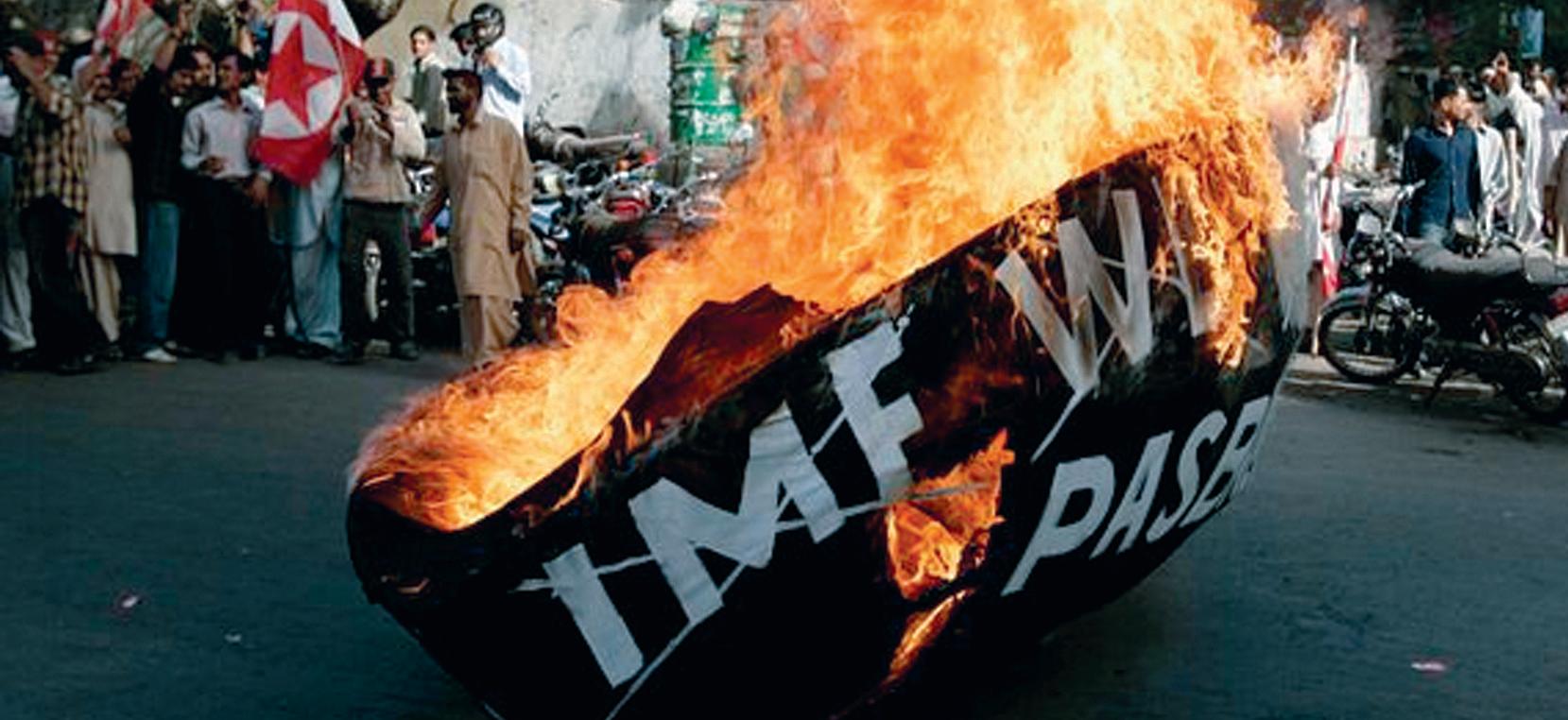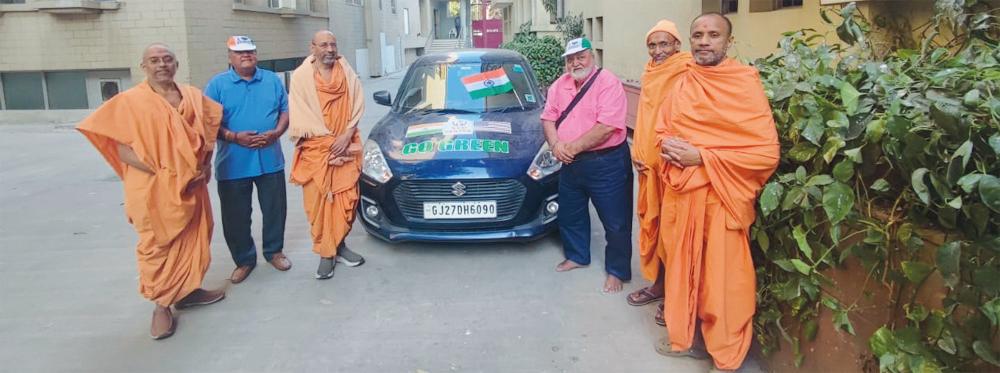
3 minute read
Pakistan Taking Desperate Measures for IMF Release of Bailout Package
Islamabad: Finance Minister Ishaq Dar on Wednesday tabled the Finance (Supplementary) Bill, 2023, in both houses of the parliament, outlining tax measures to raise an additional Rs170 billion in the next four and half months to meet the last prior actions agreed upon with the International Monetary Fund (IMF) to secure early disbursement of about $1.2bn instalment.
Two measures — raising the federal excise duty (FED) on cigarettes and increasing the general sales tax (GST) rate from 17 per cent to 18pc — have been immediately implemented through statutory regulatory orders (SROs). The Federal Board of Revenue (FBR) expects to generate Rs115bn from these two measures.
The finance bill, generally known as the mini-budget, also proposes increasing GST from 17pc to 25pc on 33 categories of goods covering 860 tariff lines — including high-end mobile phones, imported food, decoration items, and other luxury goods. However, this raise will be notified through another notification.
Through the finance bill, the excise duty on cement has been raised from Rs1.5 to Rs2 per kilogram, a measure estimated to fetch another Rs6bn.
The excise duty on carbonated/aerated drinks has been raised to 20pc from 13pc to raise an additional Rs10bn for the government.
A new excise tax of 10pc was proposed on non-aerated drinks like juices — mango, orange, etc. — to raise an additional tax of Rs4bn.
The increase in excise duty on business-, first- and clubclass air tickets will raise an additional Rs10bn for the government. A tax rate of 20pc (or Rs50,000, whichever is higher) has been proposed on the value of air tickets.
The government has also proposed a 10pc withholding tax on functions and gatherings held in marriage halls, marquees, hotels, restaurants, commercial lawns, clubs, community places, or other places. The FBR expects to raise Rs1bn to Rs2bn from this tax.
Under the income tax, the bill proposes a 10pc withholding tax on off-market sales and purchase of shares to document the unseen transactions.
On completely built mobile phone imports, the sales tax rate has been raised to 18pc from 17pc on mobile phones costing between $200 to $500. However, a 25pc sales tax will be charged on mobile sets worth $500 or above. The increase in sales tax to 25pc from 17pc on luxury items will lead to an additional revenue collection of Rs4bn.
The luxury items that will be subject to 25pc sales tax in the category of food import include confectionary, jams and jelly, fish and frozen fish, sauces, ketchup, fruits and dry fruits, preserved fruits, cornflakes, frozen meat, juices, pasta, aerated water, ice cream, and chocolates.
Other categories of items are home appliances, cosmetics, crockery, pet food, private weapons and ammunition, shoes, chandeliers and lighting (except energy savers), headphones and loudspeakers, doors and window frames, travelling bags and suitcases, sanitary ware, carpets (except from Afghanistan), tissue paper, furniture, shampoos, automobiles, luxury mattresses and sleeping bags, bathroom ware, toiletries, heaters, blowers, sunglasses, kitchenware, cigarettes, shaving goods, luxury leather apparel, musical instruments, saloon items like hair dryers, etc., and decoration/ornamental articles.
These measures proposed through the finance bill are in addition to earlier steps agreed upon with the IMF, including increasing electricity and gas rates and allowing a freefloating exchange rate.
To offset the inflationary impact of the budget, the government proposed that handouts under the BISP welfare scheme to be increased to a total of Rs400bn from Rs360bn.
Soon after laying the bill in the National Assembly and Senate, the finance minister told reporters that Senate recommendations on the bill would come on Friday (tomorrow). The bill would be taken up in the National Assembly on the same day, he said, adding that it was expected to pass the bill into an act on Monday or Tuesday.
The IMF has given a deadline of March 1 for the implementation of all these measures. However, the bulk of tax measures worth Rs115bn was already implemented from Feb 14 through SROs. The Pakistan government is trying its best to secure a deal with the International Monetary Fund (IMF) for the release of a critical bailout package, failing which it can slump into default. -- Dawn
Masterji’s ‘Go Green’ Indian Yatra
by Jawahar malhotra
houston: Last December, surrounded by a small group of admirers, Masterji Indravadan Trivedi, the celebrated classical Indian dancer, dramatist, painter and Hindu priest, had shared his plans for his planned trip to India on a to multi-city trek to spread knowledge about his “Go Green” initiative.


It was an ambitious plan to “raise self-awareness of one’s place in the world and impart practical spiritual education,” explained Masterji, “distilled from years of my own experiences and knowledge.”
Realizing that people grasp ideas better through demonstrations, Masterji intended to use puppets to teach young children and pantomime, a craft he knows well from years as a dancer, when addressing university gatherings.
The Houston Team left on January 3 and has completed its mission in several cities in Gujarat as the portly, 75 year-old Masterji, sometimes in a wheelchair during the long distance treks, Pankaj Trivedi and Jay Prakash made their rounds. In Ahmedabad, they met with Mayor Kirit Kumar and in Baroda with Mayor Keyur Narayandas Rokadia and gave them messages of goodwill from Houston Mayor Sylvetser Turner.

On January 26, India’s Republic Day, the Team visited the Sardar Vallabhbhai Patel’s Statue of Unity near the Narmada River Dam and raised the Indian Tricolor.
The trek will proceed from Gujarat to Delhi and end in Lucknow, UP. The volunteer team is staying in Government bungalows and gives seminars in local schools and universities in events co-organized by the Lions Club of India.






